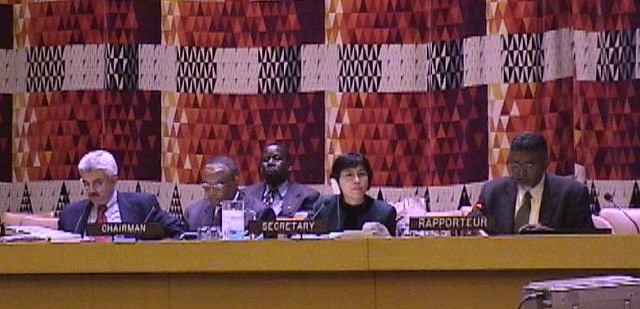Subtopics | Major recommendations/conclusions |
|
The role of human resources in revitalizing public administration | Member States should: - focus the reform of their public administration systems on achieving the conditions that will ensure and facilitate the attainment of the MDGs, including faster economic development at national and local levels, as a sine qua non for having the resources needed to deliver adequate and effective services;
- adopt a holistic national strategy to strengthen the management of human capital in the public sector;
- revisit core values and principles as outlined in national civil service legislation and charters, examine the coherence of their human resources management institutional framework, review recruitment and promotion strategies and incentives, institutionalize workforce planning, and ensure the representation of marginalized social groups.
The Secretariat should: - continue to focus its work on the reform/revitalization of the practice of public administration, underlining its central role in the achievement of the goals of the State, enumerating and clarifying shared universal principles, and exploring and shedding light on the demands and exigencies that require adaptation in different settings;
- carry out policy research and technical cooperation on the role of human resources management in revitalizing public administration;
- build on the successful outcomes of the Global Forum on Reinventing Government, by assisting in developing regional and national strategies to reinvent government; and
- establish regional and sub-regional programmes/projects for strengthening the strategic capacity of public administration units.
|
|
The role of the public sector in advancing the knowledge society | Member States should: - make their national public administrations into the major facilitating factor in transitioning to knowledge society, by enabling knowledge creation, dissemination and utilization throughout the whole society. This would require the adoption of policy frameworks that focus on people and information as society’s two main assets; and
- perceive the national public administrations as e-governments, that produce and seek knowledge in order to use it to deliver public value to the citizens.
The Secretariat should: - enhance the role of the United Nations Online Network in Public Administration and Finance (UNPAN) to develop and disseminate knowledge and information on best practices, systematically and regularly; and
- continue studying the issue of the knowledge society and direct its efforts to specific areas of interest for Governments, for example, the ways in which knowledge development leads to informed public policy-making.
|
|
Strengthening public administration for the MDGs: a partnership building approach | The Council should reaffirm the role of the public service in the fulfilment of the specific national goals for socioeconomic development, as they are key indicators of Member States’ attainment of the Millennium Development Goals. To this end, the Committee reiterates its earlier recommendation to the Council that it devote one of its next high-level segments to the changing role of a public administration geared to development, both economic and human, in order to achieve the Millennium Development Goals, with public service delivery as the pivotal element. The segment could be entitled “A service-oriented public administration for the achievement of the Millennium Development Goals.” Member States should: - pursue the issue of partnerships through South-South cooperation, in order to strengthen their capacities at all levels and in order for civil society to develop the necessary framework, tools and processes for formulation of pro-poor policies and programmes and the implementation of the commitments of the MDGs;
- develop approaches, methodologies and tools for, and knowledge on, citizen-based policy formulation and performance monitoring that are independent, transparent and inclusive;
- pay attention to low ratios of tax revenues to GDP, an indicator of low internal resource mobilization and, consequently, of low levels of resources for distribution and developmental activities; and
- disseminate available data on the public sector and strive to produce consolidated general government accounts that include the revenue by
type and expenditure by functions, by all levels of government —central, local, public enterprises etc.
The Secretariat should: - develop innovative tools, such as the code of accountability and engaged governance norms, as well as a database of best practices and indicators, and provide the necessary skills to Governments at all levels and civil society to carry out more informed, rigorous and analytical dialogue with their partners, for the development, implementation and monitoring of pro-poor strategies and other MDGs.
|
|
Public sector institutional capacity for African renewal | The Council should recommend to the international organizations and the donor community that they should increase financial, material and technical support to African States with a view to strengthening governance and public administration institutions on the continent. African Governments should take the following specific measures to strengthen their institutional capacities: - (a) Implement the Governance and Public Administration Programme of the African Union.
- (b) Institute mechanisms for the implementation and dissemination of the Charter for the African Public Service.
- (c) Adopt methods, processes and systems, such as decentralized governance, that foster opportunities for popular participation in the governance and development process.
- (d) Strengthen the law-making, oversight and budget review capacities of the legislature.
- (e) Depoliticize the public service and transform it into a professional and nonpartisan, but politically sensitive, agent.
- (f) Strengthen the judiciary to ensure predictability and peaceful resolution of disputes arising out of trade, industrial and international relations.
The United Nations system should continue providing substantive technical and advisory support aimed at strengthening governance and public administration institutions in African States. It should also assist the secretariat of the New Partnership for Africa’s Development (A/57/304, annex) in implementing the Governance and Public Administration Programme for Africa approved in Stellenbosch, South Africa, in May 2003, and adopted by the African Union, and should assist in the implementation of regional integration programmes and projects. It should also support research and dissemination of information on the application of traditional institutions and practices to public administration within the context of globalization and regional integration.
|
 Welcome to the United Nations
Welcome to the United Nations
